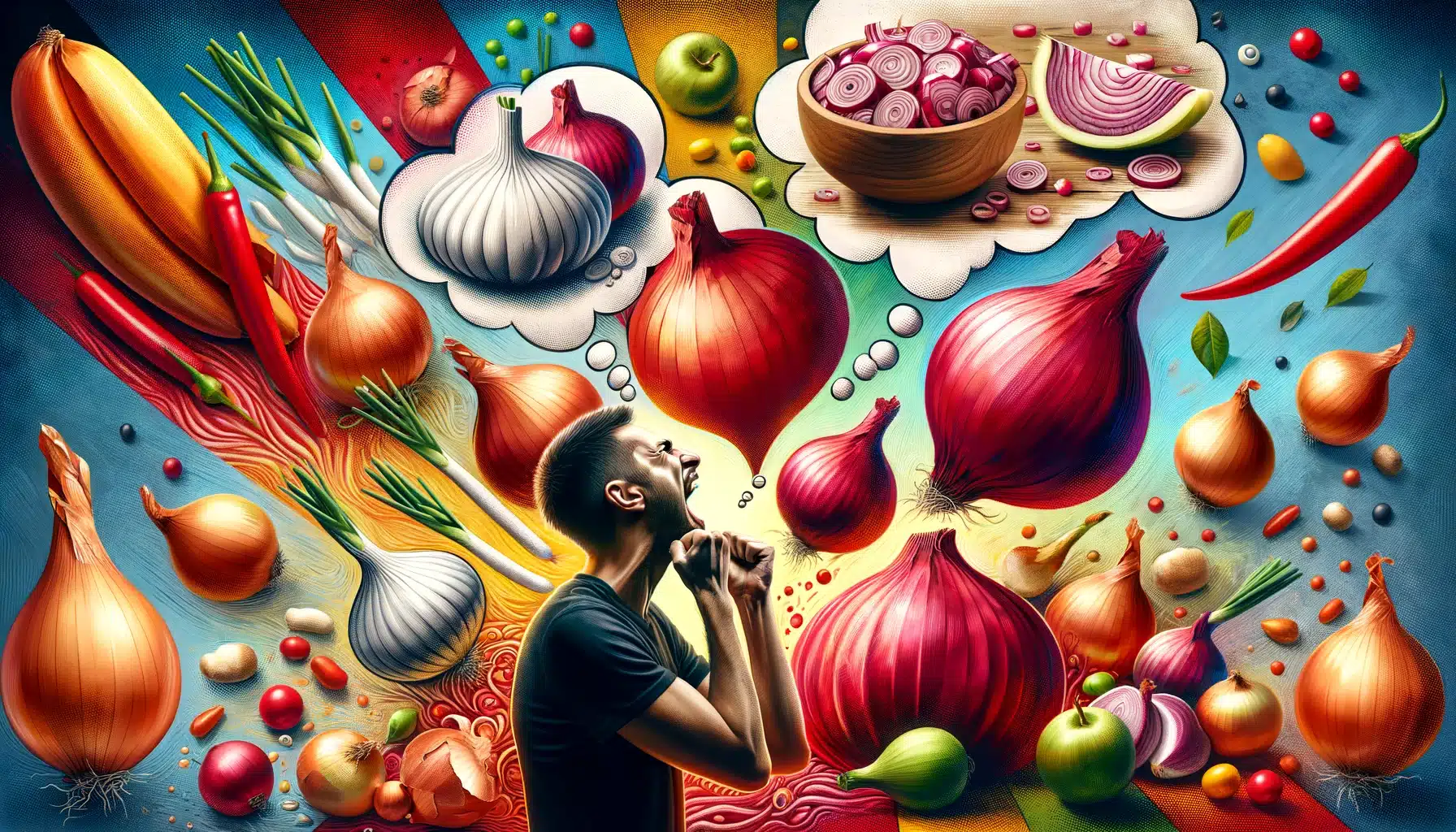Why am I craving onions?

Cravings for specific foods like onions can stem from a variety of factors, including nutritional needs, emotional states, and even your body’s intuitive response to its internal environment. Here’s a closer look at why you might be craving onions:
- Nutritional Needs: Your body might be signaling a need for certain nutrients that onions provide. Onions are rich in vitamins (such as vitamin C and folate), minerals (such as potassium), and antioxidants. They also contain flavonoids and sulfur compounds that have various health benefits. A craving for onions might indicate your body’s desire for these nutrients.
- Flavor and Sensory Satisfaction: Sometimes, cravings are less about nutritional needs and more about seeking a particular flavor, texture, or sensory experience. Onions add a unique flavor and crunch to dishes, and your body might be seeking that specific taste or texture.
- Emotional Eating: Cravings can also be tied to emotions. If eating onions or dishes with onions has been associated with comfort or positive memories in the past, you might crave them during times of stress or emotional upheaval as a way to seek comfort.
- Habit and Preference: If onions are a staple in your diet or you’ve recently had a dish with onions that you enjoyed, your craving might simply reflect a habit or a developed preference for their taste.
- Body’s Intuition: Some theories suggest that cravings can be the body’s intuitive way of guiding you toward foods that contain substances it needs to balance or heal itself. While not always scientifically proven, this theory holds that your body might be seeking the anti-inflammatory or other health-promoting properties of onions.
If you’re frequently experiencing strong cravings for specific foods like onions and are concerned about what they might mean for your health, it might be helpful to consult with a healthcare professional or a dietitian. They can offer personalized advice and ensure that your diet is balanced and meeting your nutritional needs.
What are the most common food cravings?
Cravings for specific types of food can vary widely among individuals, but there are several common cravings that many people experience. One of the most common cravings is for sweets, such as chocolate, candy, and other sugary treats. This craving is often linked to the body’s desire for a quick source of energy or an emotional response seeking comfort or a mood boost. Similarly, many people crave salty snacks like chips, pretzels, and popcorn, which can be tied to the body’s need for electrolytes or simply a preference for the taste and texture of these foods.
Carbohydrates are another common craving, with many people reaching for bread, pasta, rice, or potatoes. These cravings can be driven by the body’s need for energy, as carbs are a primary energy source, or by the comforting, filling sensation these foods provide. Fatty foods, including cheese, fried foods, and pizza, are also frequently craved, possibly due to their rich flavors and textures, as well as their ability to provide satiety.
Interestingly, some individuals experience strong cravings for specific types of cuisine, such as spicy foods or dishes from a particular culture, reflecting personal taste preferences or sometimes a need for variety in their diet. Additionally, cravings for non-nutritive items like ice or clay, a condition known as pica, can indicate nutritional deficiencies or other health issues and should be evaluated by a healthcare professional.
Understanding the underlying reasons for cravings can be complex, involving a mix of physiological, psychological, and emotional factors. While indulging in cravings in moderation can be part of a balanced diet, consistently craving and consuming large amounts of these foods, especially those high in sugar, salt, and unhealthy fats, can lead to nutritional imbalances and health issues over time.
Are raw onion more nutritious than cooked?
When it comes to the nutritional differences between raw and cooked onions, it’s a nuanced topic because the cooking process can both diminish and enhance certain nutritional aspects. Raw onions tend to retain more of their vitamin C content, as well as certain B vitamins, which are known to be sensitive to heat. These vitamins play crucial roles in supporting the immune system, skin health, and energy production. On the other hand, cooking onions can sometimes increase the bioavailability of other nutrients and beneficial compounds. This means that while the heat might reduce the overall content of some vitamins, it can also make other nutrients easier for your body to absorb.
The cooking process can also alter the chemical structure of some compounds in onions, potentially making them more beneficial in some respects. For example, cooking can break down cell walls, which might make it easier for your body to access and utilize the nutrients contained within those cells. However, the heat from cooking can also reduce the effectiveness of certain antioxidants found in onions that are beneficial for reducing inflammation and combating free radicals.
The choice between consuming onions raw or cooked ultimately depends on personal preference and the specific health benefits you’re hoping to obtain. Both raw and cooked onions can contribute valuable nutrients to your diet, so including a mix of both can be a good strategy to maximize their overall health benefits. If you’re aiming for a specific nutritional goal or managing a health condition, it might be helpful to consult with a healthcare professional or a dietitian for tailored advice.
ChatGPT
Writer
ChatGPT is a large language model developed by OpenAI, based on the GPT-3.5 architecture. It was trained on a massive amount of text data, allowing it to generate human-like responses to a wide variety of prompts and questions. ChatGPT can understand and respond to natural language, making it a valuable tool for tasks such as language translation, content creation, and customer service. While ChatGPT is not a sentient being and does not possess consciousness, its sophisticated algorithms allow it to generate text that is often indistinguishable from that of a human.
